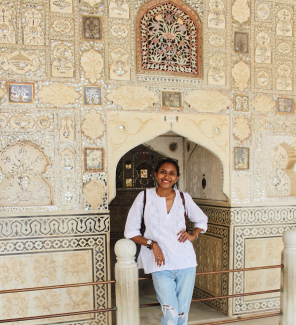
I balance my notebook delicately on my legs, shifting in my seat in the office. Simultaneously, I make sure to continue making eye contact with the participant across from me, nodding as they speak. Outside, the weather is hot and humid—typical of a South Indian summer. Meanwhile, the office is cool and comfortable, just enough to make the hot chai brought to us enjoyable. The conversation flows smoothly, and I facilitate the interview by asking additional questions. The interview eventually ends, and we finish our chai and chat before my next interview.
This is a snapshot of my past few months in India—conducting research through in depth qualitative interviews with participants, in an attempt to better understand the answers to my research questions. Based out of Pondicherry University, I had the incredible opportunity to conduct independent research as part of my internship with the Penn South Asia Center. Through the project, I investigated the relationship between perceived discrimination and mental wellbeing in Indian ethnic minorities.
When I first saw the internship posted on the SAC website, I was not sure what to expect.
I have previously completed two research internships in India, but this experience was entirely different. Unlike previous visits, this summer provided me the opportunity to work directly with a mentor in my field of Psychology. As a Psychology major at Penn, I have had incredible opportunities to conduct research with experienced mentors. My other work has involved similar themes of race, culture, and mental health. However, the field of Psychology does not have the same resources and support in different parts of South Asia as it may in the United States. Thus, this was a truly unique opportunity to examine topics extremely pertinent to my interests in a part of the world that I have always wanted to study further.
My mentor, Dr. Joey Thangal, is a psychologist and Assistant Professor at Pondicherry University. He had previously conducted many projects on similar topics around discrimination and psychology, focusing his research on various marginalized communities. Our population for the study consisted of Northeast Indian students at Pondicherry University who had migrated out of their home states into the Mainland of India. In the Indian context, the Northeast is systemically disenfranchised as a region and people in mainland India discriminate against Northeasterners extensively. As a person from the Northeast himself, Joey patiently guided me through learning about the cultural and political contexts of the communities, while also helping me navigate new research methods.
After he saw my initial interview questionnaire, Joey nodded satisfactorily. “So, we are asking people to tell us about their lives!” he proclaimed. And so began what was an incredible learning experience, as a researcher and as a student, and an unlearning process, as a mainlander myself.
The project incorporated a mixed-methods approach, and was designed in two phases. Within the first phase, I familiarized myself with a range of qualitative methodologies, focusing primarily on the Interpretative Phenomenological Approach (IPA). After designing the interview questions with Joey’s help, we began to conduct interviews. The interviews asked about participant experiences with acculturation to the mainland, racism, and so forth. Simultaneously, I created a survey instrument by adapting pre-existing scales in Psychological research to quantitatively measure perceived discrimination, culture shock, and wellbeing. We conducted a couple pilot studies with this instrument, and the rest of the summer was spent on transcribing interviews and data analysis.
This summer involved the completion of the qualitative first phase, with the second phase planned for this upcoming winter and next summer. Within the second phase, I hope to implement the designed quantitative instrument with a larger population size of several hundred individuals. Further, the population of the study will be expanded to include African immigrants to India, given the racism and acculturative stress they also face within mainland India. Thus, the study will be restructured and conducted in Delhi in its second phase, examining two differently marginalized communities and the discrimination they experience.
Looking back at my experience this summer, I am sincerely appreciative of it. With the help of an incredible mentor and the support of SAC, I learned qualitative interviewing and analyzing skills. Further, I was able to develop my independent research design and data collection techniques. In addition, I gained the opportunity to expand a summer project into a yearlong study for publication. Throughout the process, I learned more about my own privilege as an upper caste individual from mainland India, and the complex ethno-religious and caste politics within the country and larger region. I am truly grateful to have studied topics that I am incredibly passionate about, and I hope to return to India in the near future to continue research on discrimination and mental health.
